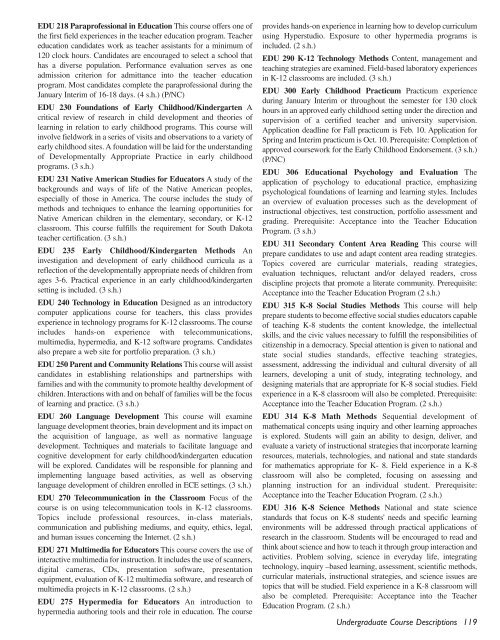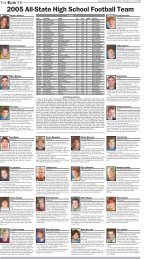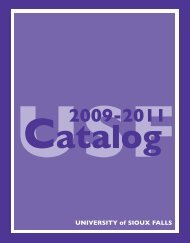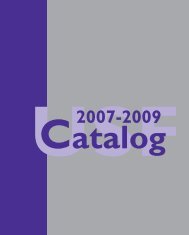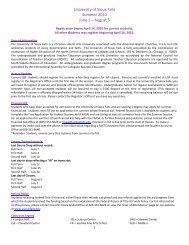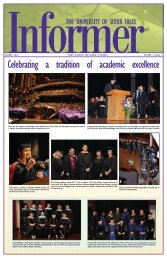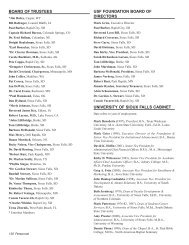USF TELEPHONE DIRECTORY - University of Sioux Falls
USF TELEPHONE DIRECTORY - University of Sioux Falls
USF TELEPHONE DIRECTORY - University of Sioux Falls
You also want an ePaper? Increase the reach of your titles
YUMPU automatically turns print PDFs into web optimized ePapers that Google loves.
EDU 218 Parapr<strong>of</strong>essional in Education This course <strong>of</strong>fers one <strong>of</strong><br />
the first field experiences in the teacher education program. Teacher<br />
education candidates work as teacher assistants for a minimum <strong>of</strong><br />
120 clock hours. Candidates are encouraged to select a school that<br />
has a diverse population. Performance evaluation serves as one<br />
admission criterion for admittance into the teacher education<br />
program. Most candidates complete the parapr<strong>of</strong>essional during the<br />
January Interim <strong>of</strong> 16-18 days. (4 s.h.) (P/NC)<br />
EDU 230 Foundations <strong>of</strong> Early Childhood/Kindergarten A<br />
critical review <strong>of</strong> research in child development and theories <strong>of</strong><br />
learning in relation to early childhood programs. This course will<br />
involve fieldwork in a series <strong>of</strong> visits and observations to a variety <strong>of</strong><br />
early childhood sites. A foundation will be laid for the understanding<br />
<strong>of</strong> Developmentally Appropriate Practice in early childhood<br />
programs. (3 s.h.)<br />
EDU 231 Native American Studies for Educators A study <strong>of</strong> the<br />
backgrounds and ways <strong>of</strong> life <strong>of</strong> the Native American peoples,<br />
especially <strong>of</strong> those in America. The course includes the study <strong>of</strong><br />
methods and techniques to enhance the learning opportunities for<br />
Native American children in the elementary, secondary, or K-12<br />
classroom. This course fulfills the requirement for South Dakota<br />
teacher certification. (3 s.h.)<br />
EDU 235 Early Childhood/Kindergarten Methods An<br />
investigation and development <strong>of</strong> early childhood curricula as a<br />
reflection <strong>of</strong> the developmentally appropriate needs <strong>of</strong> children from<br />
ages 3-6. Practical experience in an early childhood/kindergarten<br />
setting is included. (3 s.h.)<br />
EDU 240 Technology in Education Designed as an introductory<br />
computer applications course for teachers, this class provides<br />
experience in technology programs for K-12 classrooms. The course<br />
includes hands-on experience with telecommunications,<br />
multimedia, hypermedia, and K-12 s<strong>of</strong>tware programs. Candidates<br />
also prepare a web site for portfolio preparation. (3 s.h.)<br />
EDU 250 Parent and Community Relations This course will assist<br />
candidates in establishing relationships and partnerships with<br />
families and with the community to promote healthy development <strong>of</strong><br />
children. Interactions with and on behalf <strong>of</strong> families will be the focus<br />
<strong>of</strong> learning and practice. (3 s.h.)<br />
EDU 260 Language Development This course will examine<br />
language development theories, brain development and its impact on<br />
the acquisition <strong>of</strong> language, as well as normative language<br />
development. Techniques and materials to facilitate language and<br />
cognitive development for early childhood/kindergarten education<br />
will be explored. Candidates will be responsible for planning and<br />
implementing language based activities, as well as observing<br />
language development <strong>of</strong> children enrolled in ECE settings. (3 s.h.)<br />
EDU 270 Telecommunication in the Classroom Focus <strong>of</strong> the<br />
course is on using telecommunication tools in K-12 classrooms.<br />
Topics include pr<strong>of</strong>essional resources, in-class materials,<br />
communication and publishing mediums, and equity, ethics, legal,<br />
and human issues concerning the Internet. (2 s.h.)<br />
EDU 271 Multimedia for Educators This course covers the use <strong>of</strong><br />
interactive multimedia for instruction. It includes the use <strong>of</strong> scanners,<br />
digital cameras, CDs, presentation s<strong>of</strong>tware, presentation<br />
equipment, evaluation <strong>of</strong> K-12 multimedia s<strong>of</strong>tware, and research <strong>of</strong><br />
multimedia projects in K-12 classrooms. (2 s.h.)<br />
EDU 275 Hypermedia for Educators An introduction to<br />
hypermedia authoring tools and their role in education. The course<br />
provides hands-on experience in learning how to develop curriculum<br />
using Hyperstudio. Exposure to other hypermedia programs is<br />
included. (2 s.h.)<br />
EDU 290 K-12 Technology Methods Content, management and<br />
teaching strategies are examined. Field-based laboratory experiences<br />
in K-12 classrooms are included. (3 s.h.)<br />
EDU 300 Early Childhood Practicum Practicum experience<br />
during January Interim or throughout the semester for 130 clock<br />
hours in an approved early childhood setting under the direction and<br />
supervision <strong>of</strong> a certified teacher and university supervision.<br />
Application deadline for Fall practicum is Feb. 10. Application for<br />
Spring and Interim practicum is Oct. 10. Prerequisite: Completion <strong>of</strong><br />
approved coursework for the Early Childhood Endorsement. (3 s.h.)<br />
(P/NC)<br />
EDU 306 Educational Psychology and Evaluation The<br />
application <strong>of</strong> psychology to educational practice, emphasizing<br />
psychological foundations <strong>of</strong> learning and learning styles. Includes<br />
an overview <strong>of</strong> evaluation processes such as the development <strong>of</strong><br />
instructional objectives, test construction, portfolio assessment and<br />
grading. Prerequisite: Acceptance into the Teacher Education<br />
Program. (3 s.h.)<br />
EDU 311 Secondary Content Area Reading This course will<br />
prepare candidates to use and adapt content area reading strategies.<br />
Topics covered are curricular materials, reading strategies,<br />
evaluation techniques, reluctant and/or delayed readers, cross<br />
discipline projects that promote a literate community. Prerequisite:<br />
Acceptance into the Teacher Education Program (2 s.h.)<br />
EDU 315 K-8 Social Studies Methods This course will help<br />
prepare students to become effective social studies educators capable<br />
<strong>of</strong> teaching K-8 students the content knowledge, the intellectual<br />
skills, and the civic values necessary to fulfill the responsibilities <strong>of</strong><br />
citizenship in a democracy. Special attention is given to national and<br />
state social studies standards, effective teaching strategies,<br />
assessment, addressing the individual and cultural diversity <strong>of</strong> all<br />
learners, developing a unit <strong>of</strong> study, integrating technology, and<br />
designing materials that are appropriate for K-8 social studies. Field<br />
experience in a K-8 classroom will also be completed. Prerequisite:<br />
Acceptance into the Teacher Education Program. (2 s.h.)<br />
EDU 314 K-8 Math Methods Sequential development <strong>of</strong><br />
mathematical concepts using inquiry and other learning approaches<br />
is explored. Students will gain an ability to design, deliver, and<br />
evaluate a variety <strong>of</strong> instructional strategies that incorporate learning<br />
resources, materials, technologies, and national and state standards<br />
for mathematics appropriate for K- 8. Field experience in a K-8<br />
classroom will also be completed, focusing on assessing and<br />
planning instruction for an individual student. Prerequisite:<br />
Acceptance into the Teacher Education Program. (2 s.h.)<br />
EDU 316 K-8 Science Methods National and state science<br />
standards that focus on K-8 students' needs and specific learning<br />
environments will be addressed through practical applications <strong>of</strong><br />
research in the classroom. Students will be encouraged to read and<br />
think about science and how to teach it through group interaction and<br />
activities. Problem solving, science in everyday life, integrating<br />
technology, inquiry –based learning, assessment, scientific methods,<br />
curricular materials, instructional strategies, and science issues are<br />
topics that will be studied. Field experience in a K-8 classroom will<br />
also be completed. Prerequisite: Acceptance into the Teacher<br />
Education Program. (2 s.h.)<br />
Undergraduate Course Descriptions<br />
119


